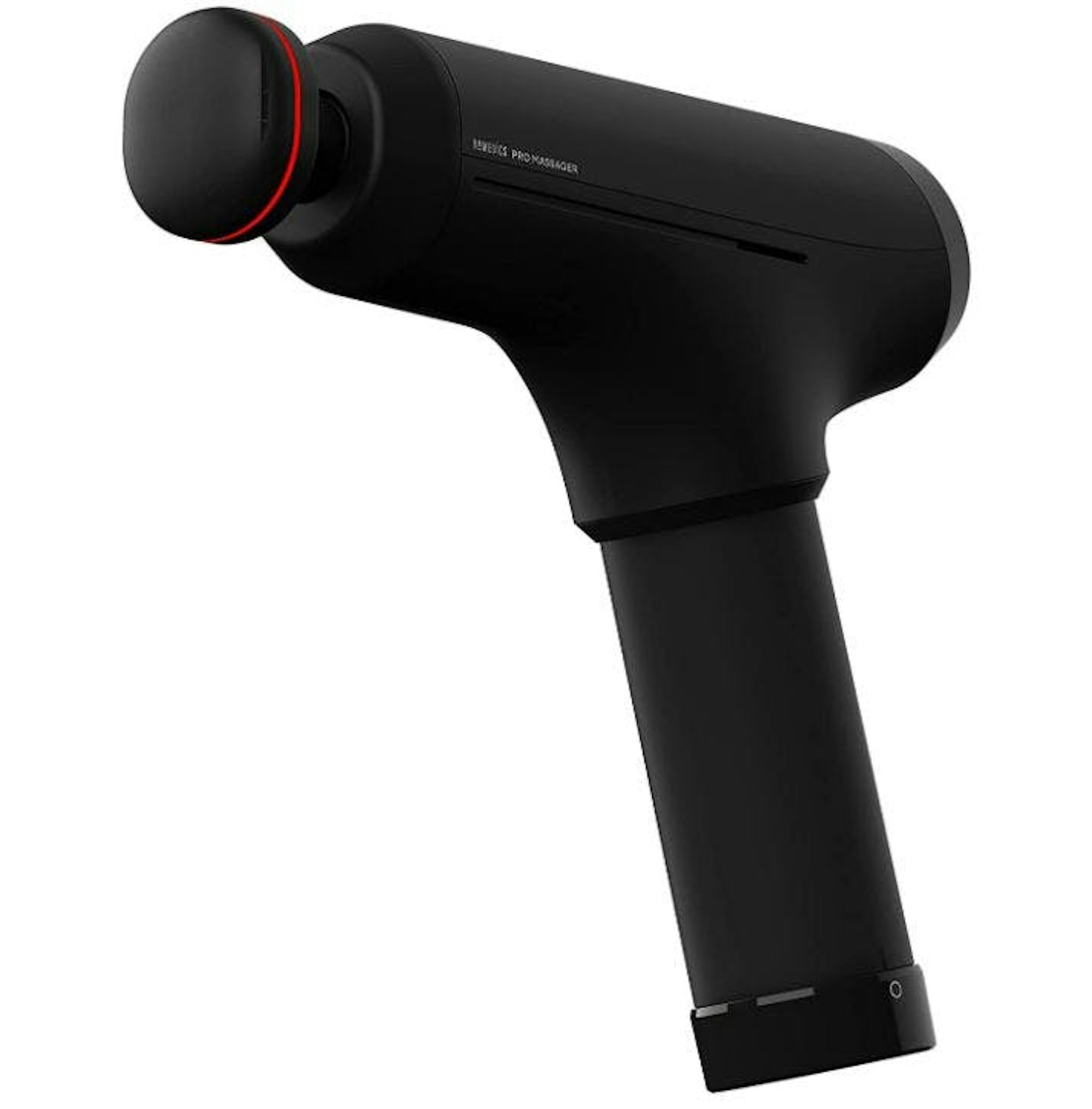The best massage guns won't have you feeling sore the day after your workout. Delayed onset muscle soreness – aka DOMS – is a tell-tale sign that you’ve been exercising well, that your muscle has been worked and is in the process of repairing and growing. Though it’s a sign of positive changes, it can be uncomfortable. While there’s no magic cure to DOMS, you can alleviate and prevent some of your aches and pains using a massage gun.
A massage gun creates a series of rapid impacts on your muscles, stimulating the muscle, inducing some fresh blood flow and releasing tension. This is called percussive therapy or vibration therapy, and it can be a handy way of helping your muscle groups feel better. We've found that it's especially effective when combined with active recovery and a healthy diet full of protein.
Due to the stimulation of the muscles, some people like to use massage guns as a form of warm-up, getting the blood pumping into the muscle group that’s going to be worked and increasing flexibility.
At What’s The Best, we’ve been lucky enough to try our hands (and treat our muscles) with an array of the best massage guns. Our experts have put the best to the test, using the massage guns on DOMS encountered from all forms of exercise, from climbing and netball to cardio and strength training. Below, you’ll find the massage guns that we’ve found to do the job.
The best massage gun for hot and cold treatment
“Cheaper massage guns have come before this one and none really hit the spot – either too noisy or with fiddly power controls, they have proved annoying to use and now live in a drawer.
"This Homedics unit, however, is now a regular part of my post-workout routine thanks to its easy three-power mode selector and super quiet operation. Its heated head is a great touch, too. It's also covered by a three-year warranty, which came in useful when it stopped charging after two years' heavy use.
“It comes with six heads and a guide on how and where to use them, and the barrel-shaped one is great for a tight IT band, while the arrow shape is good for getting into achy calves after a long ride on my bike.
“Whether or not the heating head delivers on its promise of opening up blood flow to an affected area I don't know (it takes about 90 seconds to get to full temp) but it does at least feel nice especially a day after training, so it's now my go-to attachment.
"Initially I didn't get much use from the cold head - you have to put it in the freezer, which I forget to do, and even then, it doesn't feel as cold as I'd like, or stay cold that long.
"Recently though I've discovered its gel pad is the perfect consistency for treating the shin splits I get when I overdo it at football. It's soft enough to avoid too much pain but still enables you to target sore spots, whether you chill it down or not - nothing else has given me relief from this condition.
"Being really fussy though I'd prefer it to come with a USB-C charger like my other gadgets, instead of the barrel-shaped adaptor, which is only used for this device." Tried and tested by Adam Binnie, Fitness contributor (updated March 2024)
Pros
- Great modes
- Heated head
- Well made
Cons
- Non-USB charger
| Maximum speed | 3000rpm |
| Weight | Approx. 900g |
The best massage gun under £100
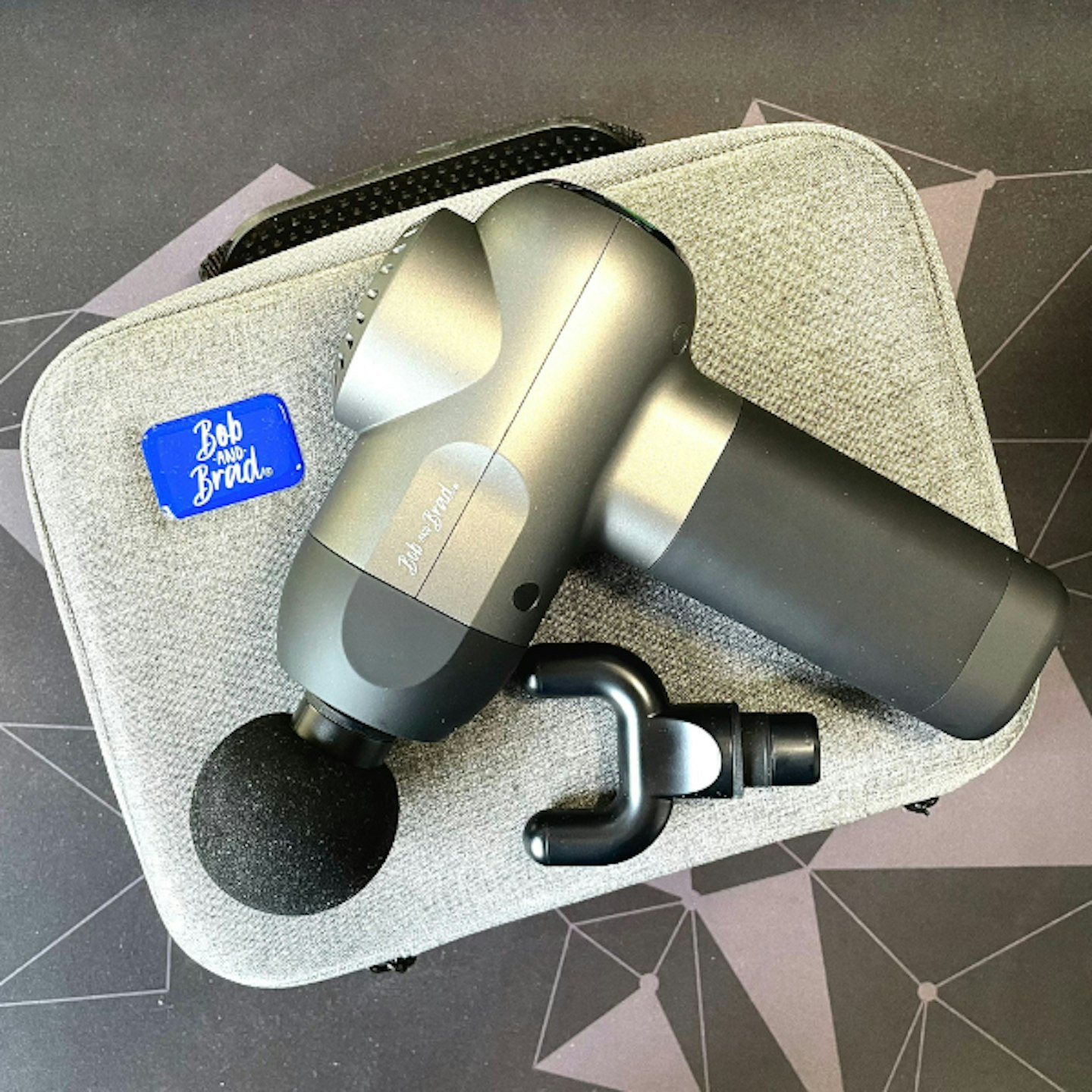 What's The Best
What's The Best“The Bob and Brad massage gun has five intensity settings that crank the effect of the percussive treatment – in truth, you’ll probably only need the first two, the higher settings are a tad brutal. The pace of the standard setting was my favourite, offering a deep humming vibration in the muscle, without ever feeling like a test of endurance. I found it particularly useful for working out DOMS in my quads and calves, and traps and forearms.
The set comes with all the attachments you could need, which is welcome. After a few weeks, you’ll find your favourites for each area. For me, the ball attachment was used most of the time, while the fork came in useful for working out tightness in my calves after long hikes.
The Bob and Brad massage gun feels like a sturdy piece of kit, which I am sure will last me years of use. The battery too is impressive, with one full charge lasting for weeks of use.” Tried and tested by William Lobley, Deputy Tech & Fitness Editor
Pros
- Well made
- Good choice of settings
- Long battery life
Cons
- Not all heads will be used
| Maximum speed | 3200rpm |
| Weight | 680g |
The best massage gun kit
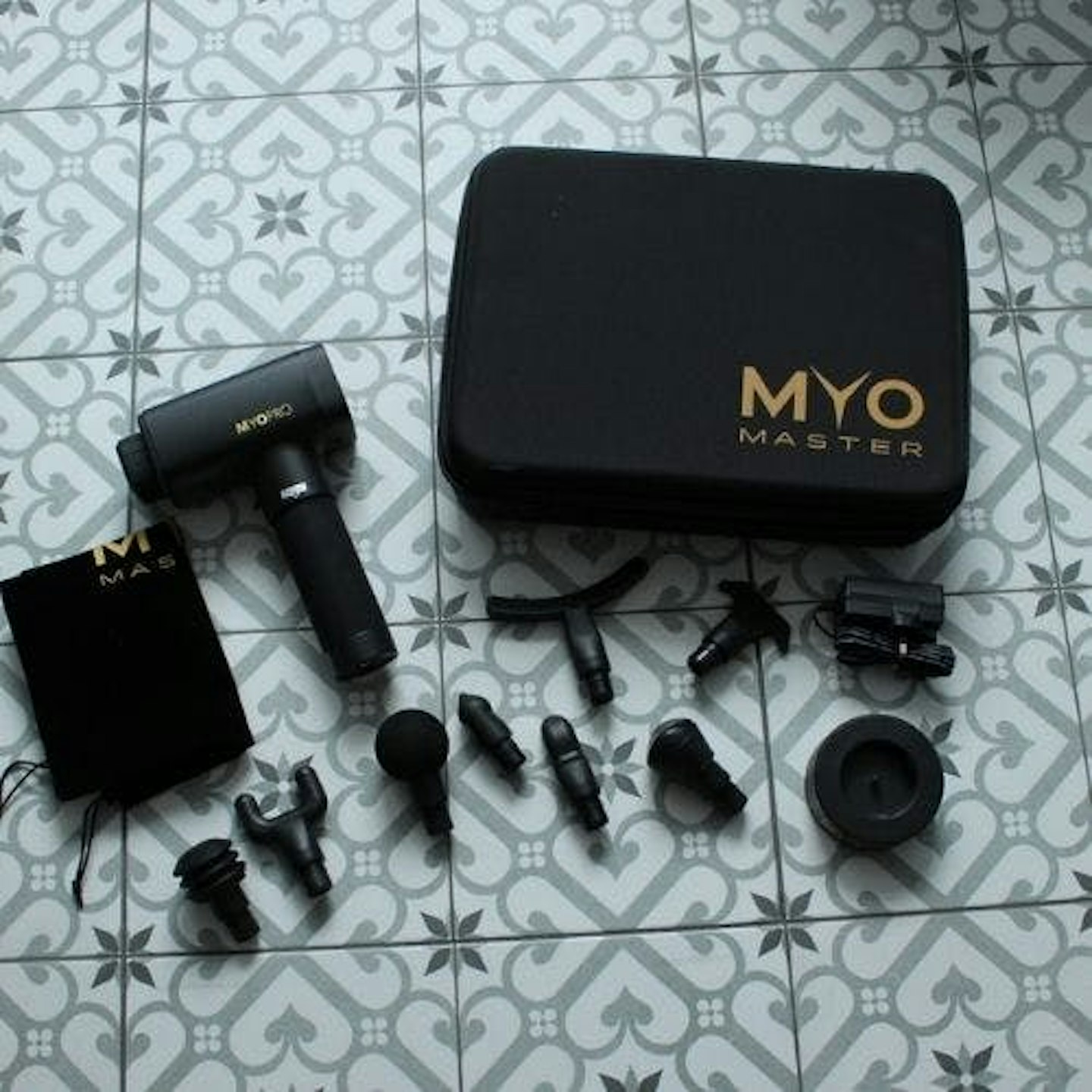 What's The Best
What's The Best"After doing a 90-minute yoga session in my dining room, I cooled down using the MyoMaster MyoPro percussion massager, and it was dreamy. Instead of using a generic massager head, I opted for 'The Scraper', which sounds scary but is designed to help with larger muscles and hamstrings. With all the stretching, my legs were feeling sore and worked, and this made them feel better instantly.
"Although I wouldn't take this to the gym as it's bulky, it's essential for any home workouts. If you have an at-home set-up you need this in your life. Other benefits include long battery life, and a quiet motor - quieter than a hairdryer. Good value across the board."
Pros
- Excellent settings
- Low noise
- Loads off attachments
Cons
- Not everyone will use all the heads
| Maximum speed | Not provided, five settings |
| Weight | 1kg |
The best mini massage gun
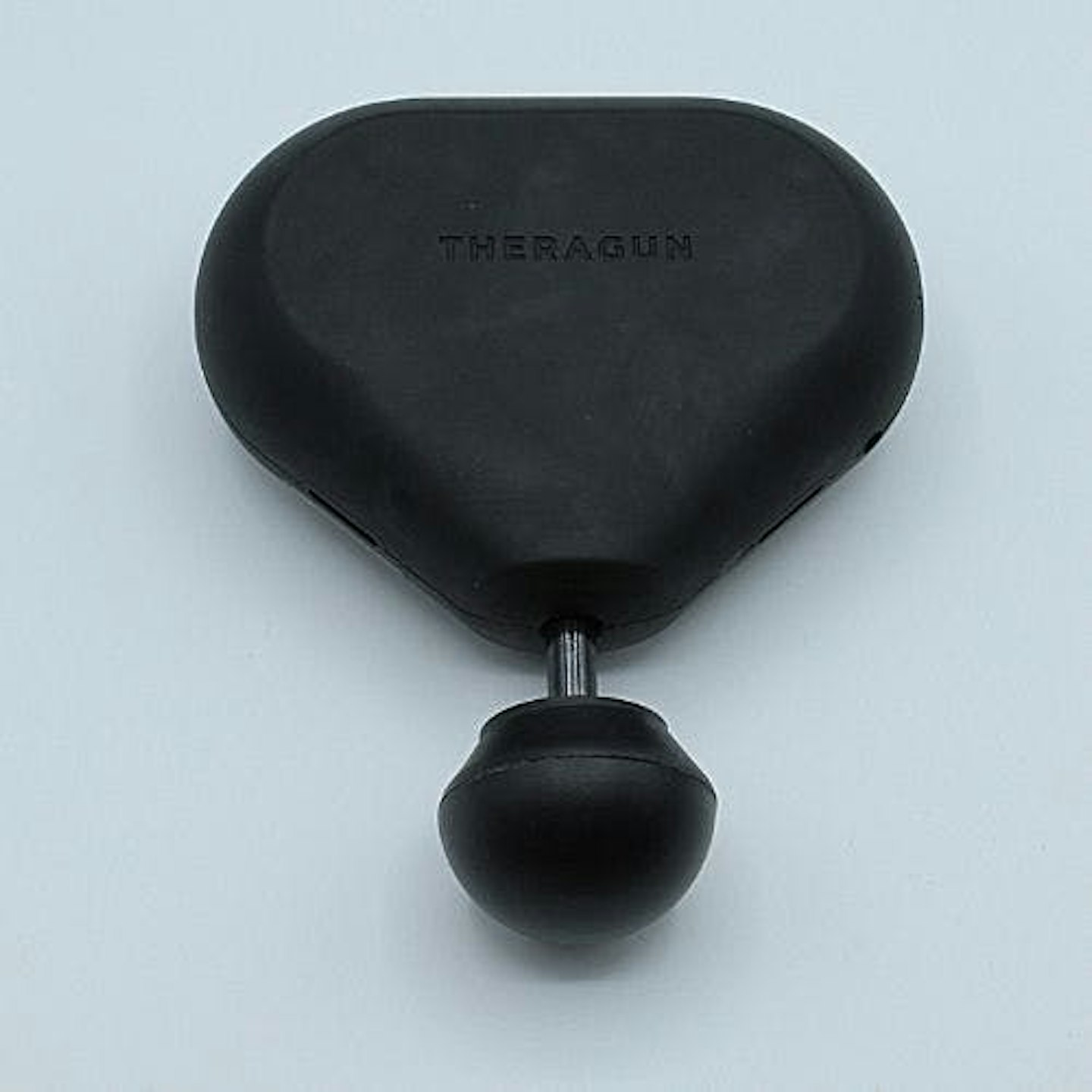 What's The Best
What's The Best"This changed my life – it's a bold statement, but it's true. I had a car accident a few years ago and my shoulder/lower back has never been the same. Since using the Theragun mini, I've seen some good improvements. At first, I was intimidated by this bit of kit because it's so powerful (up to 2400 percussions per minute to be exact). However, once I overcome the hesitation from the speed, I never looked back.
"When working at a desk, the stiff feeling in my back goes from bad to worse. I've been using the gun on my back and the bottom of my feet and within a few minutes of applying, I feel totally relaxed.
"That said, is a massage gun worth it? Absolutely. The benefits don't stop there, I like how quiet it is and the fact its compact size means it could effortlessly fit in my gym bag.” Tried and tested by Lily Anderson, Fitness contributor
Pros
- Compact
- Robust
Cons
- Expensive
| Maximum speed | 2400rpm |
| Weight | 450g |
The best premium massage gun
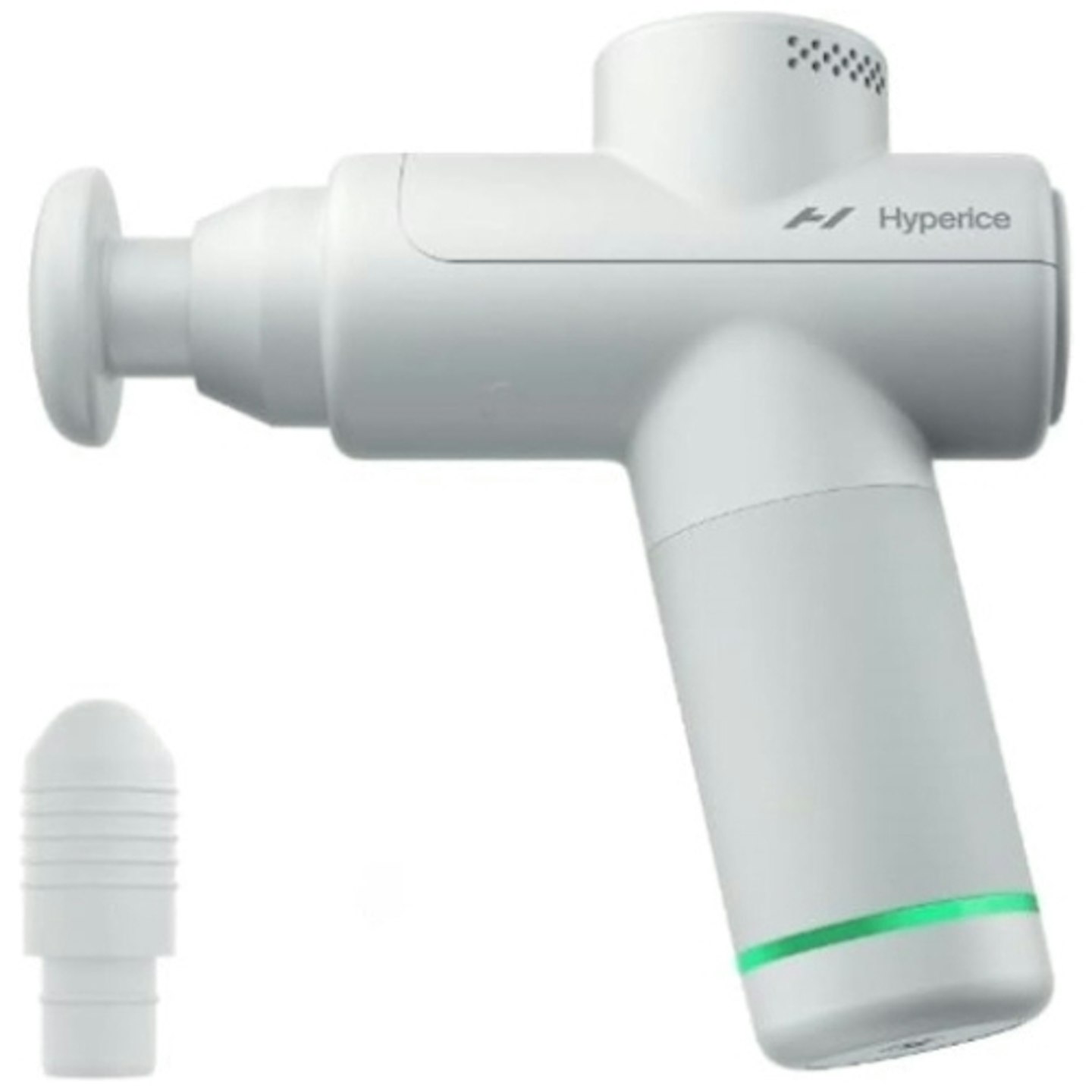
"I've previously relied on foam rollers to ease my muscles after a heavy HIIT workout, but I’ve found them uncomfortable, painful and just downright annoying. So, I was really excited to get my hands on the Hypervolt GO. The lightweight device charges up quickly is comfortable in the hand and is really quiet. The green ring around the bottom keeps you updated with the battery life, and so far, I've used it at least three times in a week for a good 15 minutes and it's still on green. There are three speeds to choose from - I start out on the lowest and then gradually move up to the highest on each session. There are also two heads to use, depending on where you're targeting.
"If you've only used foam rollers before, it's a strange sensation, but you soon become used to it. I can't quite believe the difference if I'm honest. I use it as soon as I get home from my class, and it immediately releases tension in my thighs and calves, where I suffer most after a workout. It also helps with the day two post-workout ache, which hasn't been nearly as intense since I started using it.
"It's the perfect size for a gym bag and is great for an at-home massage - useful if you often wake up with cricks in your shoulders or neck. This is a really high-quality piece of kit, and my only disappointment is that I didn't discover it sooner." Tried and tested by Jade Moscrop, Fitness contributor and Editor
Pros
- Excellent settings
- Long battery
- Trusted by athletes
Cons
- Expensive
| Maximum speed | Not provided, five settings |
| Weight: | 1.1kg |
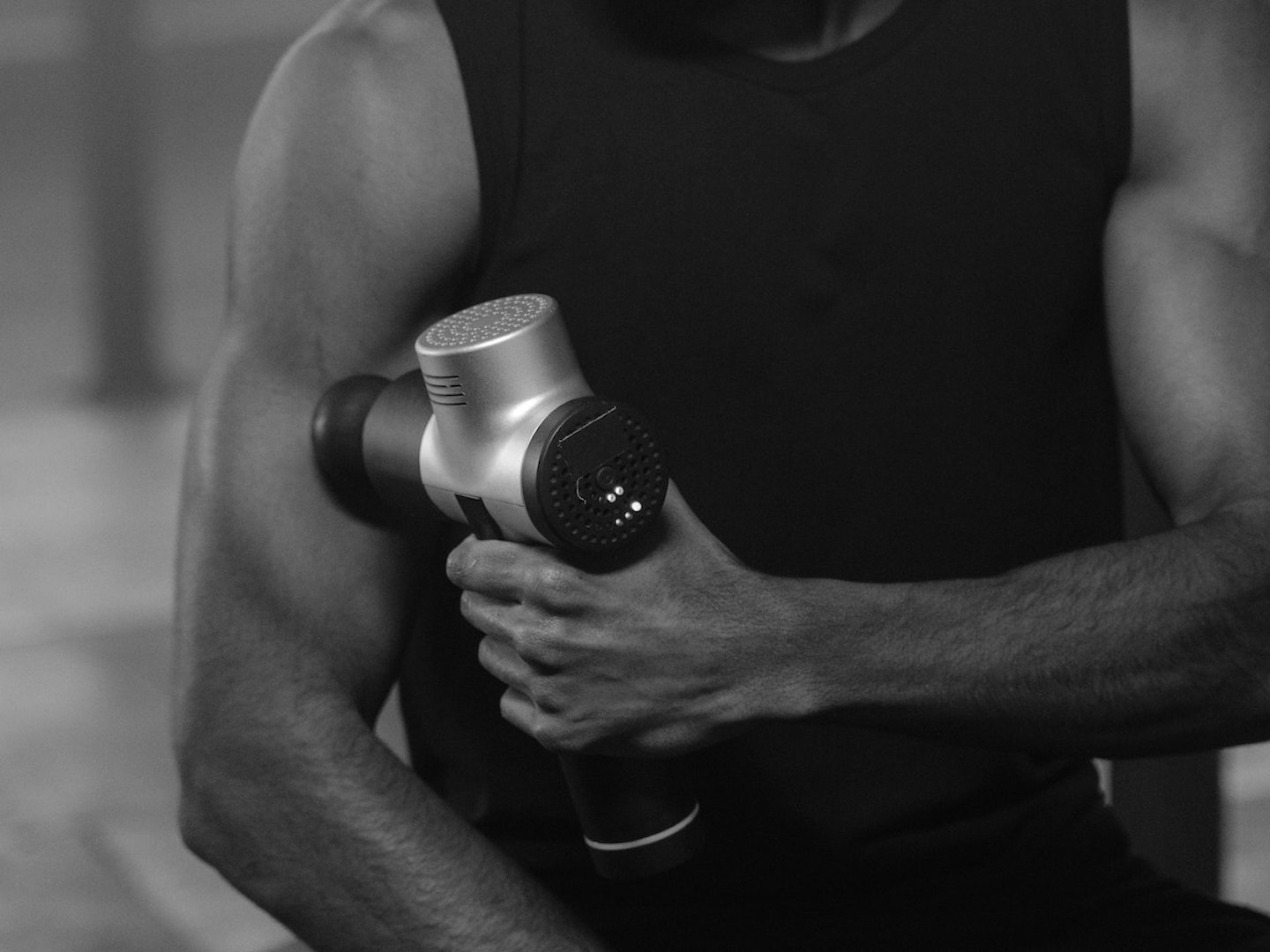
Using the best massage guns
The intent behind using a massage gun is not unlike that of a foam roller – albeit the massage gun can be used with greater accuracy to pinpoint sections of a muscle group. And just like foam rollers, you can go overboard with a massage gun. A massage gun is to be used for a maximum of two minutes per muscle group, with 30 seconds to one minute of use being ample in most cases.
Additionally, using a massage gun isn’t a case of “more pain, more gain”. A gentle touch is all that’s required, often on the lowest setting. As you are treating sore muscles, it’s okay for the muscle to feel tender and sore, but you should stop the second it moves into hurtful pain.
Similarly, the massage gun should not be applied to wounded or bruised areas. The percussive therapy of a massage gun is going to do nothing to help sprains and pulls – in fact, it’s probably going to make them worse.
Here are 7 tips to follow to ensure you use a massage gun correctly:
• Decide whether or not you're going to use this pre or post-workout. Use it for one or the other – not both. Over-stimulating a muscle group can also cause issues.
• If you're going to use this to warm up, place the massager on the area you're going to focus on today (i.e arms) and hold this for approximately 30 to 60 seconds. If you're using this to warm down, check how long you can use the device.
• Do not use the massage gun on any bones, where you have any injuries including bruises or wounds.
• If you have any medical conditions, always consult your doctor before using this type of fitness equipment.
• For the best results, use this gun every day. Remember to never exceed the recommended usage time, you can usually find this in your manual.
• Go gentle. Remember this isn't a race. If it hurts, remove it immediately.
When to use a massage gun
There are those that swear by massage guns as a post-workout tool, while others use them religiously before a session. The truth is that there are benefits for both - what you should be asking is how it improves your training before and after you exercise.
Pre-workout use will warm up your muscles and post-workout will facilitate muscle recovery. We love that these massagers often come with easy carrier cases, which is brilliant news if you need to transport them with you to the gym, running track or anywhere else for that matter.
For any non-athletes, this doesn’t mean that you can’t use the massager. When you experience any pain in your legs, feet or shoulders – just apply it when you’re nice and relaxed.
Do massage guns work?
You can see them being used by physiotherapists and behind the scenes at sporting events – but do they really work? Research into this area is thin on the ground. There is some promise as a few pieces of research emerge showing positive results, but that’s as far as it goes for now.
One thing that does support the use of massage guns is that the theory behind them has the same basis as the concept of active recovery. Active recovery is where you take part in some light exercise on your rest days to stimulate blood flow through your muscles. By doing this, you’re helping to “remove waste products from soft tissue that have been broken down by intense exercise” (via UCHealth Today). At the same time, the new blood delivers healing nutrients to further aid in recovery.
It should be noted that while a massage gun stimulates a similar process, it does not increase your heart rate above its resting BPM. This is an important element of the active recovery process. This means that while massage guns can help as part of your recovery, they should not replace movement and traditional active recovery processes.
So, do massage guns work? In theory, yes – though there still needs to be more research to back the point up. However, anecdotally and through our own testing, we have found them a welcome tool in our recovery toolbox.
Which massage gun head to use?
To understand what massage gun head to use, you need to know what types of massage heads are compatible with your machine. Here are the most common types of massage gun heads that are available:
Ball attachment: Usually the standard attachment that comes with the equipment, a ball head is a great option for beginners. Use this on your back, arms, legs, shoulders and soles of your feet for a relaxing result.
Fork/U-shaped attachment: Want to relieve tension from your neck and shoulders? After working from home all day, this will feel incredible on your body. Plus, it's great for massaging your calf muscles too.
Flat attachment: Another tool great for a full body massage is a flat head, it's also good for working with more dense muscle groups, like your biceps.
How to use a massage gun correctly:
Before we run down tips and tricks to use your massage gun properly, make sure you do your research before using your massage gun. We'd recommend following the manufacturer's manual to the letter - for example, most models will suggest you only use the device on a specific area for a maximum of two minutes.
You can also watch incredible how-to videos like this one on the Therabody YouTube channel:
Do massage guns get rid of knots?
The answer to this is simple – yes, the best massage guns will help to get rid of knots. Pulse Roll said, "A massage gun delivers strong pulses and vibrations into the muscle tissue promoting better circulation, relaxing the muscles, and easing pain and soreness." Meaning all the tension created in your muscle tissue is broken up. However, it’s never going to be as good as visiting a physiotherapist – get the okay from one first before you start self-treating your knots.
Are massage guns good for you?
The benefits of massage guns are well documented; the best massage guns relieve stress and tension as well as improve poor circulation. But, the good work doesn't stop there - if you're someone who suffers from soreness after training at the gym, this handy tool will ensure you never suffer again. Why? Because it soothes muscles.
Like with every piece of equipment, you must understand the risks involved. Medical News Today found, "With incorrect use, massage guns may injure the body. For instance, they may cause ruptured blood vessels, nerve sensitivity, or muscle fibre damage."
That said, as long as you use a massage gun correctly, you shouldn't have to worry about any problems.
William Lobley is a Deputy Tech & Fitness Editor and reviewer for What's The Best, specialising in technology, gaming, and outdoors. He also writes for Empire Online.
Subscribe to the What’s The Best Newsletter to keep up to date with more of the latest reviews and recommendations from the rest of the What’s The Best team.
.jpg?ar=16%3A9&fit=crop&crop=top&auto=format&w=1440&q=80)
